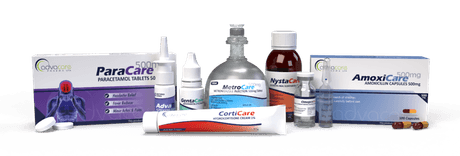Aluminum Hydroxide + Magnesium Hydroxide Tablets
Aluminum Hydroxide + Magnesium Trisilicate Tablets
Antacid Suspension
Atropine Injection
Berberine HCl Tablets
Bisacodyl Tablets
Calcitriol Capsules
Calcium Chloride Injection
Calcium Gluconate Injection
Calcium Lactate Tablets
Chlorpropamide Tablets
Cholecalciferol Injection
Cimetidine Injection
Cimetidine Tablets
Diatrizoate Meglumine + Diatrizoate Sodium Injection
Domperidone Oral Suspension
Domperidone Tablets
Epinephrine (Adrenaline) Injection
Esomeprazole Capsules
Famotidine Tablets
Ferrous Fumarate Tablets
Ferrous Sulfate + Folic Acid Tablets
Ferrous Sulfate Tablets
Folic Acid Tablets
Gas Relief Capsules
Gas Relief Oral Drops
Glibenclamide Tablets
Glimepiride Tablets
Glipizide Tablets
Granisetron HCl Injection
Hyoscine Butylbromide Tablets
Hyoscine Injection
Lactulose Oral Solution
Lansoprazole Capsules
Lansoprazole Tablets
Loperamide Capsules
Magnesium Injection
Mebeverine HCl Tablets
Metformin HCl Tablets
Metoclopramide Injection
Metoclopramide Oral Solution
Metoclopramide Tablets
Misoprostol Tablets
Naloxone Injection
Omeprazole Capsules
Omeprazole for Injection
Ondansetron Injection
Ondansetron Tablets
Oral Rehydration Salts
Orlistat Capsules
Pantoprazole for Injection
Pantoprazole Tablets
Potassium Chloride Injection
Potassium Chloride Tablets
Propantheline Bromide Tablets
Rabeprazole Capsules
Ranitidine HCl Injection
Ranitidine Tablets
Sodium Bicarbonate Tablets
Tolbutamide Tablets
Vitamin B Complex Capsules
Vitamin B Complex Injection
Vitamin B Complex Tablets
Vitamin B1 Injection (Thiamine HCl)
Vitamin B1 Tablets
Vitamin B6 Injection (Pyridoxine HCl)
Vitamin B6 Tablets
Vitamin C Injection
Vitamin C Tablets


